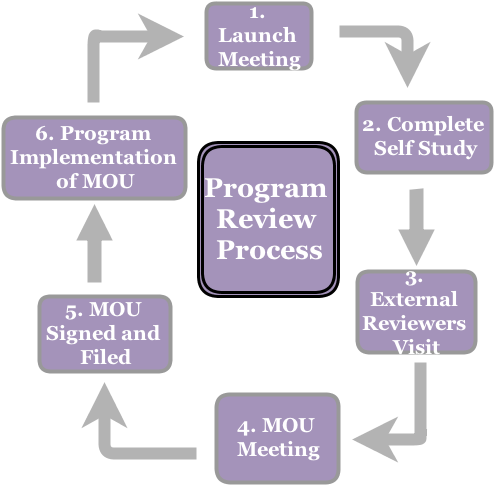
Final Program Review Flow Chart

Final Program Review Flow Chart
It is a process that will give you the opportunity to:
The Office of Academic Assessment and Program Review is not here to admonish or judge. The Office is intended to provide support to the Programs/Departments undergoing review, specifically during the final year of your 7-year program review cycle when you write the self-study, conduct an external review, and write a new MOU for the next 7 years. In addition, the office provides you with some of the files needed for the review (i.e. assessment reports, the previous self-study and MOU, etc.) The Office is happy to answer any questions or address any concerns throughout the process.
Though Program Review is housed in CIELO, it operates through the Office of the Provost.
The initial phase of program review begins with the Launch Meeting. At that meeting, general information about the program review process and the self-study in particular is provided to programs up for review in the current year. The Program Review Coordinator invites the Chairs and self study authors to this meeting. The faculty member responsible for annual assessment work in each of these programs is also invited.
The self study is a report documenting the program’s progress over the past 7 years. The report has five parts:
(See the Self Study Guidelines (.doc) on the Forms, Guides, and Resources page for detailed information about what to include in the self-study.) The self study is a collaborative effort involving all faculty in the department or program, with one faculty member usually selected to compile the information and write the final report, in consultation with the Department Chair or Program Coordinator. The Self-Study is considered complete when approved by the College and signed by the Dean (see Section 6: College Level Review on the Procedures and Policy (.doc) for further details). Once approval is received, the program sends a hard copy of the signed self study to the Office of Program Review along with an electronic copy for distribution.
After the self study is complete and approved, the Chair of the Department/Program should compile a list of names AND email and phone contact information of potential reviewers from different campuses. Keep in mind that both reviewers should not come from the same campus and that it is recommended that at least one reviewer comes from another CSU campus. Then the list must be approved by the Dean of the College. Once it is approved, the Chair/Coordinator sends it to the Office of Assessment and Program Review. The names may be ranked in order of preference. If there are any dates that should NOT be scheduled for the visit of the external reviewers (such as conference dates when several faculty will be gone), include those dates with the list. The Office will then make the offers to potential individuals and will schedule two reviewers who are available on two consecutive days when the Department can host the review. External review visits last about a day and a half, ending with a one-hour Exit Meeting on the second day. The Office of Assessment and Program Review is responsible for scheduling all non-department meetings (including those with the Vice Provost, Dean, Associate Dean, and Associate Vice Presidents of Undergraduate and Graduate Studies) and the exit meeting. The Office is also responsible for providing reviewers with travel arrangement information and supplying parking passes for their visit. The Chair or Coordinator is responsible for scheduling all other meetings with external reviewers, and is also responsible for hosting the reviewers, including possibly providing an escort around campus. (See example schedule (.xls) on the website). External reviewers provide recommendations and commendations at the Program Review Exit Meeting and then write a report based upon approved report guidelines (see External Reviewer Report Template) up to three weeks after the visit. The Office only reimburses expenses incurred by the external reviewers such as individual meals or travel arrangements, but does not reimburse expenses incurred by the Department or Program such as faculty meals with the external reviewers.
The Memorandum of Understanding (MOU) is a report containing commendations and recommendations for the Program. It is drafted by Program Review Coordinator, in consultation with Vice Provost, based on the external reviewers’ report. The draft is circulated to the Chair (or Program Director), Vice Provost, Dean, Associate Dean, Associate Vice Presidents of Undergraduate and Graduate Studies, and the EPC and GSC Representatives. The Chair distributes copies of the draft to other relevant faculty members. The Program has the option to respond to the MOU with a written response. The draft MOU and any response from Program (which can be written in advance if the program chooses) is thoroughly discussed at the MOU meeting, scheduled by Program Review Office and convened by Vice Provost. The final MOU is drafted by the Program Review Coordinator based on decisions made at this meeting.
The final MOU is approved by all attendees at the MOU meeting. It is then signed by the Vice Provost, after which the Office of Program Review sends it to the President, Provost, Program, and attendees of the MOU meeting.
The Program implements the recommendations as laid out in the MOU. Progress on the implementation of these recommendations and related program activities will be on the agenda for at least one faculty meeting each academic year between reviews. The Program should continuously review its MOU and assessment results to implement changes for the future until the next launch meeting.
Bonnie Paller is the Program Review Coordinator for the Office of Academic Assessment and Program Review, and Diana Zepeda is the Student Assistant. They can both be reached at 818-677-6717 or by email at bonnie.paller@csun.edu and program.review@csun.edu.